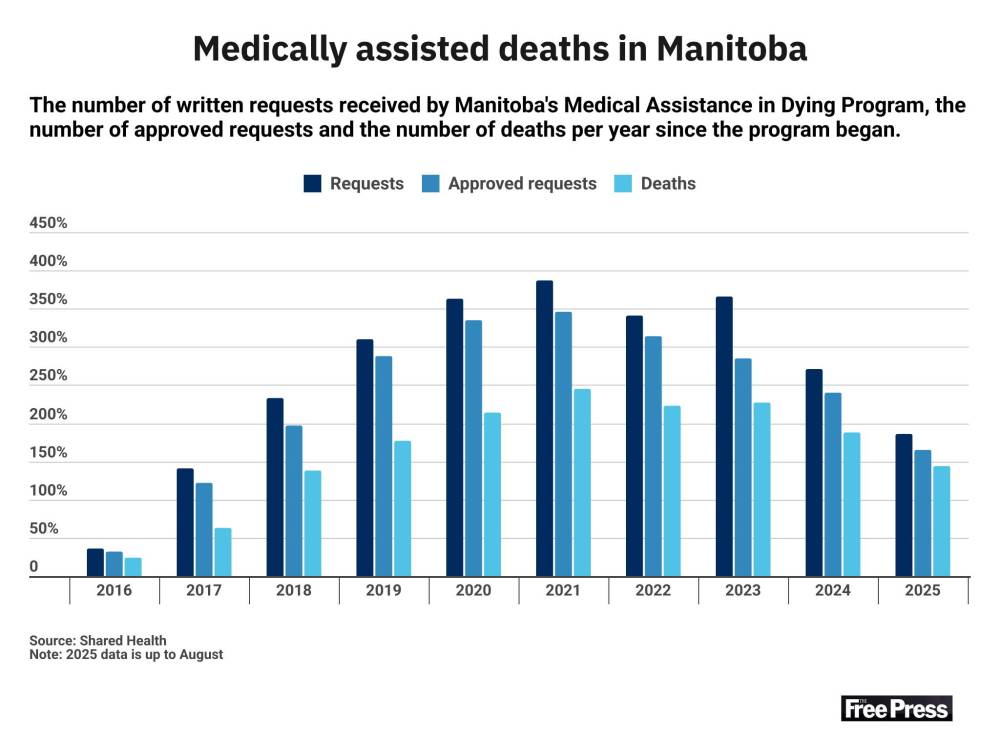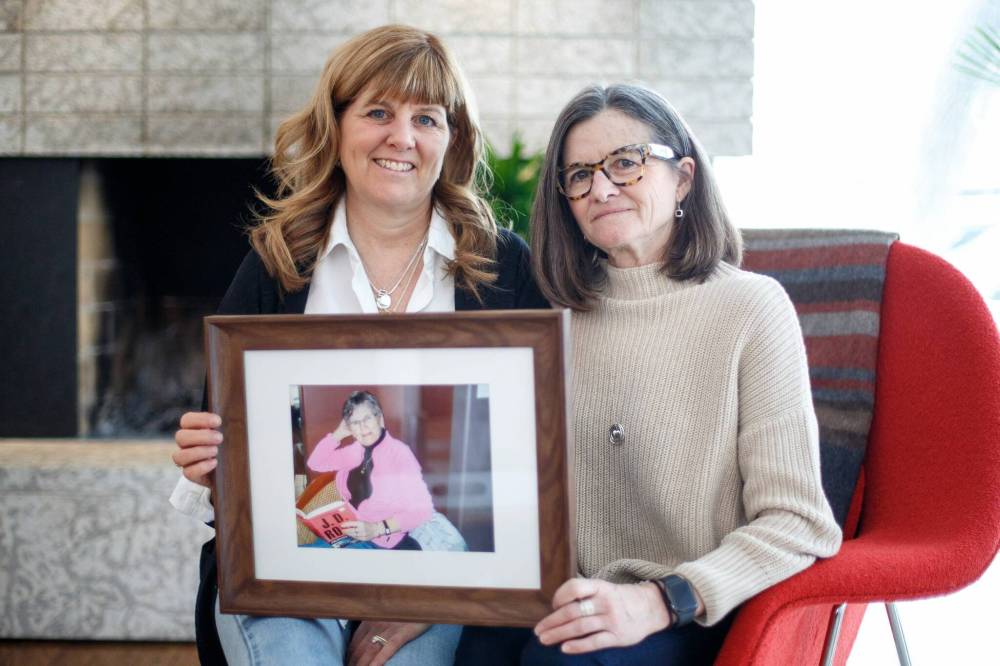Number of Manitobans using MAID levels off
Advertisement
Read this article for free:
or
Already have an account? Log in here »
To continue reading, please subscribe:
Monthly Digital Subscription
$0 for the first 4 weeks*
- Enjoy unlimited reading on winnipegfreepress.com
- Read the E-Edition, our digital replica newspaper
- Access News Break, our award-winning app
- Play interactive puzzles
*No charge for 4 weeks then price increases to the regular rate of $19.00 plus GST every four weeks. Offer available to new and qualified returning subscribers only. Cancel any time.
Monthly Digital Subscription
$4.75/week*
- Enjoy unlimited reading on winnipegfreepress.com
- Read the E-Edition, our digital replica newspaper
- Access News Break, our award-winning app
- Play interactive puzzles
*Billed as $19 plus GST every four weeks. Cancel any time.
To continue reading, please subscribe:
Add Free Press access to your Brandon Sun subscription for only an additional
$1 for the first 4 weeks*
*Your next subscription payment will increase by $1.00 and you will be charged $16.99 plus GST for four weeks. After four weeks, your payment will increase to $23.99 plus GST every four weeks.
Read unlimited articles for free today:
or
Already have an account? Log in here »
The number of Manitobans who choose a medically assisted death appears to have plateaued.
A Freedom of Information request by the Free Press found 188 people died in 2024, the second-lowest number since 177 used the program in 2019.
The records also show that from 2020, the first year of the COVID-19 pandemic, to 2023, the number of assisted deaths was fairly stable with 214, 245, 223 and 277, respectively, during those years.

Until August this year, 144 Manitobans have chosen to end their lives with medical assistance.
Since the program began in mid-2016, 1,455 people have used MAID in Manitoba.
Nationally, the rate has grown by about 31 per cent each year, while the most recent figures show an increase of only 15.8 per cent from 2022 to 2023. In total, 15,343 people received MAID across Canada in 2023, another 2,906 applicants died before getting MAID, 915 people were deemed ineligible and 496 withdrew their request.
Betty Sanguin was one of the 223 Manitobans who used MAID in 2022, a year after being diagnosed with ALS, also known as Lou Gehrig’s disease.
Her daughter, Lynda Sanguin-Colpitt, said her 86-year-old mother got her wish to end her life in church.
“The experience was probably the most beautiful thing I’ve every experienced,” she said.
“(My mother) was so happy. She invited every one of her closest friends and she got to hug them and say goodbye to everyone. My sister and I actually thought she was having such a joyous time, and she had a bit of life in her eyes for the first time in awhile.”
Her mom “didn’t want to die in a hospital bed choking,” she said.
Sanguin-Colpitt said using the service has to be an individual choice based on the person’s needs and diagnosis.

MIKE DEAL / FREE PRESS FILES
Sisters Renée Sanguin (left) and Lynda Sanguin-Colpitts (right) with a photo of their mom, Betty, who died using MAID in 2022. Betty was 87 and had ALS.
“We should be able to choose how we die,” she said.
Salina Pirzada, a PhD student at the University of Manitoba whose thesis is about why patients request MAID, said the numbers have likely plateaued for now.
“We saw strong growth in earlier years, but now the catch-up effect has dissipated. I think it is normal to see a bit of a plateau, but now it has gone down one year, I don’t know if it will continue to trend that way.”
She said the numbers will likely jump up again when people who have a debilitating mental illness are added to the eligibility list for MAID on March 17, 2027.
The federal government had been moving to allow people with mental illnesses to apply for MAID in 2024, but delayed it after a parliamentary committee said the country’s health system wasn’t ready.
Arthur Schafer, a University of Manitoba professor and founding director of the Centre for Professional and Applied Ethics, said if everyone who qualifies for MAID receives it, then the statistics don’t mean much.
“Whether the numbers go up or down is morally irrelevant,” Schafer said. “The really relevant question is if people eligible for an assisted dying, and who are choosing it, do they have access? If so, one might see it go up one year and down the next.”
Prof. Nancy Hansen, director of the University of Manitoba’s interdisciplinary master’s program in disability studies, said she worries people with disabilities may be pushed to apply for MAID as a solution for not receiving more assistance for housing or programs.
“I’m not anti-MAID,” she said. “To me, the numbers are not worrisome at all. I’m not worried there are fewer people accessing MAID. It may just be an option and there are other options including better palliative care.”

SUPPLIED
Betty Sanguin at her “crossing over ceremony” at Churchill Park United Church.
In a statement, Health Minister Uzoma Asagwara said the decision to choose a medically assisted death is “deeply personal” and involves many considerations.
In addition to funding the program, Asagwara said the province investing in palliative care and supports so people have “meaningful options when making end-of-life decisions.” and to make sure Manitobans get “the care and dignity they deserve.”
Cancer is the most common reason Manitobans chose MAID.
In 2023, 61 per cent of the 277 people who received an assisted death had cancer.
The next most common underlying condition was split evenly between neurological and cardiovascular disease during the first eight years MAID has been offered.
kevin.rollason@freepress.mb.ca

Kevin Rollason is a general assignment reporter at the Free Press. He graduated from Western University with a Masters of Journalism in 1985 and worked at the Winnipeg Sun until 1988, when he joined the Free Press. He has served as the Free Press’s city hall and law courts reporter and has won several awards, including a National Newspaper Award. Read more about Kevin.
Every piece of reporting Kevin produces is reviewed by an editing team before it is posted online or published in print — part of the Free Press‘s tradition, since 1872, of producing reliable independent journalism. Read more about Free Press’s history and mandate, and learn how our newsroom operates.
Our newsroom depends on a growing audience of readers to power our journalism. If you are not a paid reader, please consider becoming a subscriber.
Our newsroom depends on its audience of readers to power our journalism. Thank you for your support.



